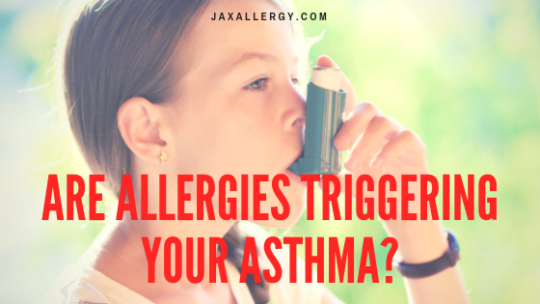Allergic Asthma: How to Know if Allergies Are Triggering Your Asthma

Allergies or asthma can make us feel miserable. But when combined the results and symptoms can be much worse. Indoor and outdoor allergies impact over 50 million Americans with a wide range of triggers. Asthma affects 1 in 13 people and causes the airways inside the lungs to constrict and narrow making it difficult to breathe.
Allergies and asthma are the two most common chronic diseases in the United States, and they occur together more often than many people realize. In fact, allergic asthma is the most common type of asthma, according to the Asthma and Allergy Foundation of America.
In Florida, allergy season begins as early as January when trees begin to release their pollen. The allergy season continues through summer and into the fall with grass pollen, ragweed pollen and molds. These allergens can trigger asthmatic symptoms in people allergic to them.
If you struggle with allergy and asthma symptoms, read on to learn more about how these two chronic diseases can be related and how to treat the symptoms.
What Is Allergic Asthma?
Allergic asthma occurs when allergens in your environment are inhaled and then trigger asthma symptoms such as shortness of breath, coughing, and wheezing. Common triggers for allergic asthma in children and adults are pollen, dust mites, cockroaches, pet dander, some medications, and mold spores.
What Causes Allergic Asthma?
Allergic reactions occur when special immune system proteins view an otherwise harmless environmental substance, such as pollen or house dust, as a harmful enemy. When these substances are inhaled into the nose or lungs, the immune system responds by releasing immunoglobulin E (IgE) to bind to the allergen in effort protect the body from “harm.”
The release IgE antibodies causes the immediate symptoms of allergic reactions, such as:
- Itchy eyes
- Runny nose
- Congestion
- Bronchospasm (asthma attack)
Severe allergic reactions include more intense symptoms, such as:
- Difficulty swallowing, talking, or breathing
- Disorientation
- Vomiting
- Anaphylaxis
In cases of allergic asthma, allergens may cause a mild or severe inflammation of the lungs leading to increased in coughing, wheezing, and shortness of breath.
Your family history can impact your chances of developing allergies or asthma. If one or both of your parents have allergies, you’re more likely to have them as well. In addition, seasonal allergies can increase your risk of developing asthma.
How Do You Treat Allergic Asthma?
There is no cure for asthma, but fortunately symptoms can be effectively managed and treated. Once your allergist identifies what is triggering your allergic reactions, through a skin or blood test, they can help create a personalized treatment plan for managing and controlling the symptoms.
Avoiding triggers is the first and best step in controlling allergic asthma. While many treatments are designed to treat asthma or nasal allergies separately, a few treatments can help alleviate both conditions.
- Montelukast (Singulair) is often prescribed for asthma and can even help with nasal allergies. The pill is taken daily and helps control inflammation that occurs during an allergic reaction.
- Allergen Immunotherapy (allergy shots) are extraordinarily effective to treat allergic asthma and nasal allergies by reducing the immune system’s response to the allergic triggers. Immunotherapy is NOT a medication. Rather it involves periodic injections with trace amounts of allergen(s) placed just below the skin, which over time retrains the immune system to stop lashing out against the environmental allergen(s). Unlike medications, immunotherapy seeks to fix the problem rather than temporarily reducing the symptoms. In most cases immunotherapy will cause allergic reactions to diminish, asthma symptoms to decrease, and many people will require less medications to control their allergies/asthma. Some people may be able to taper off medications all together. Allergen immunotherapy is highly effective and can lead to long lasting tolerance to environmental allergens.
- Anti-immunoglobulin E (IgE) therapy uses medication to disrupt the action of IgE when an allergen is present. By stopping the effects of IgE, the medication prevents an allergic reaction from occurring, and therefore prevents asthma symptoms. It is sometimes used in combination with allergen immunotherapy.
For severe allergic asthma, other medications and treatments may be required. Speak with your allergist to decide the best course of action for you to prevent reactions.
Are All Asthma Symptoms Caused by Allergies?
No. While a strong connection exists, other triggers can lead to asthma attacks such as strong odors, exercise, cold air, and other respiratory infections. Many people suffering from asthma have more than one trigger. The best way to manage symptoms is to be aware of the triggers and pay close attention as they may change over time.
Get Your Allergic Asthma Symptoms Under Control
Allergies combined with asthma can be extremely uncomfortable and even scary at times. Take charge of your health and find out what is triggering your allergy and asthma symptoms.
Get in touch with the experts at Allergy & Asthma Specialists of North Florida to schedule an appointment with an allergist. An allergist can determine which allergens are causing reactions and walk you through a personalized treatment plan so you can find relief.
